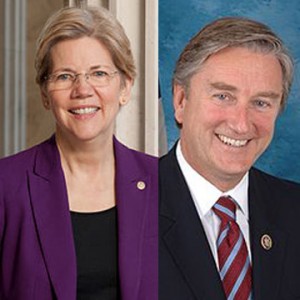Student debt is a serious problem we need to tackle long term. But the pressing issue that we have to address immediately is the doubling of interest rates on subsidized Stafford loans scheduled to go into effect on July 1. These loans are critical to low- and middle-income college students. But without Congressional action soon, the interest rate will go from 3.4 to 6.8 percent in just a few short weeks. With student debt at a record high and recent graduates struggling to repay their loans, this rate hike would strike another blow to our generation.
Students have gotten loud on this issue. And with pressure from student groups and other advocates, members of Congress have introduced a number of different proposals.
In May, the House of Representatives passed The Smarter Solutions for Students Act, which ties the student loan interest rate for all Stafford loans (subsidized and unsubsidized) to the 10-year Treasury note rate with a cap of 8.5 percent. However, interest rates are predicted to rise in the next few years — which means high interest rates for future students — and the CBO estimates that students will actually pay more in the long run under this proposal.
Last week, the Senate failed to approve two proposals of its own. The Student Loan Affordability Act was a short-term bill from Senate Democrats that extended the 3.4 percent interest rate by two years. The Comprehensive Student Loan Protection Act came from Senate Republicans, and like the Smarter Solutions for Students Act, tied the interest rate to the 10-year Treasury note rate. The latter bill had no cap and used the revenue generated for deficit reduction.
With just a few weeks to go before the deadline, short-term solutions may be our best bet for now, but longer-term solutions must ultimately be a part of the conversation. Solutions to student debt must include all stakeholders: schools, students, states, the federal government, Congress and lenders. Congress will have another chance to address college affordability challenges during the reauthorization of the Higher Education Act, set to happen soon (although who knows with Congress). Students need solutions to the recurring Pell grant shortfall, accountability and transparency from higher education institutions about how they are doing when it comes to graduating their students and how their graduates are doing in the labor force, and a loan repayment system that is clear, straightforward and based on income earned.
Students have to take responsibility here as well. Young adults entering college must have full understanding of the costs and a plan to repay their loans.
They must also work to keep their colleges accountable and advocate for states to invest in higher education and schools to rein in tuition.
With just days left before July 1, we’ll be watching Congress and lawmakers closely to see what happens with student loan interest rates. The fight extends well beyond July 1, however. It is critical that students and advocates continue to push for solutions with the same energy to ensure economic opportunity for our generation.
Amy Lin is the Deputy Policy and Organizing Director at Young Invincibles, where she leads the Organizing Team on health care, education and jobs campaigns across the country. She began her tenure at Young Invincibles leading the National Youth Bus Tour, a 3 month-long national listening tour that included 100 events in 20 states.
Lin was previously Staff and Legislative Assistant for Senator Edward M. Kennedy in his Labor Policy Office on the Senate HELP Committee. For Senator Kennedy, Amy worked on labor issues including: unemployment insurance, economy and jobs, the right to form a union, paid sick days and the Lilly Ledbetter Fair Pay Act. Amy has also served as the Staff Assistant for the Chief Economist at the U.S. Chamber of Commerce, then Development Coordinator at the Institute for Women’s Policy Research, a non-profit think tank focused on policy issues that affect women.
Amy has a B.A. in Economics from Tulane University and a Master in Public Affairs (M.P.A.) from the Woodrow Wilson School of Public and International Affairs at Princeton University.







